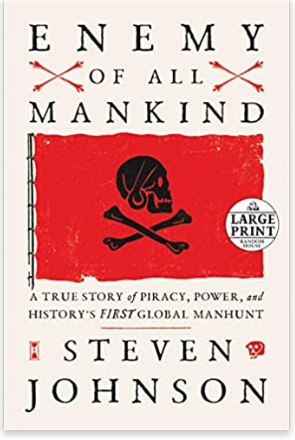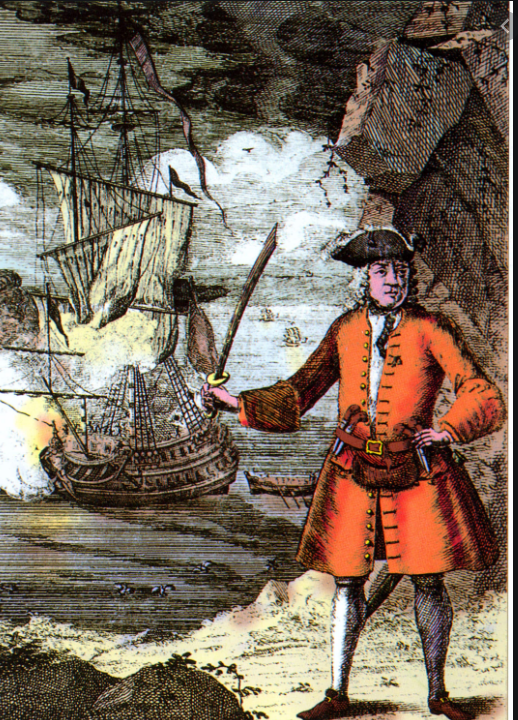
A gripping tale of one of the most lucrative crimes in history



The Avery’s most lasting legacy was the inadvertent triggering of a new model for the global economy.
Henry Every was the seventeenth century’s most notorious pirate as the British government offered enormous bounties for his capture alive or preferably dead. Every’s most lasting legacy was the inadvertent triggering of a major shift in the global economy.
Henry Every, English pirate seized treasures from the 1, 500-ton Ganj-i-Sawal ( Gunsway), owned by Aurangzeb off the coast of Surat in September 1695, known as the heist of the 17th century, and one of those rare moments where multiple long area collide in spectacular fashion.
Steven Johnson, The Plymouth American journalist and popular historian is exposing fascinating stories in detail with meticulous narrative gift that he serves clemency. From the 17th century craze for Indian calico to the speed at which the hulls of wooden ships rotted.
Henry Every, despite being the world’s notorious pirate, lauded by balladeers and pursued across oceans by the East India Company but never caught or brought to justice. He was born in the village of Newton Ferrers near Plymouth, where he took up the romantic but hazardous life of Devonshire pirate on his notoriously speedy ship, The Fancy.
Eight of his crew were later hanged for mutiny after a jury had obstinately cleared them of piracy in what was intended as a show trial in London. Every himself vanished in to thin air. His character and motives are obscure, save for a brand-building letter he wrote in 1694 insisting “ I have never as Yett Wronged any English or Dutch, nor never Intend while I am Commander.”
Claiming to be “ An Englishman’s Friend” was astute for the line between pirates and privateers such as Sir Francis Drake, who boarded Spanish vessels with official sanction, was blurred.
Steal foreign treasure out at sea, and the Crown might overlook your methods.” To be a pirate meant that you were simultaneously beneath contempt and on a thrilling road to respectability even to Knighthood.
Pirates became celebrities through the medium of song. “ French, Spaniard and Portuguese, the Heathen likewise, he made war with them until that he dies” ran one ballad celebrating Every. It is sung after he led a mutiny on a trading convoy financed by James Houblon, a member of parliament with ties to the East India Company.
Aside from patriotism, pirates gained popularity for their democratic ethos. “Every man shall have an equal vote in affairs of the moment” declared one pirate code. Their executive pay rewards structure was much flatter than modern companies with the captain and the quartermaster ( CEO) receiving two shares of any spoil to one for each member of the crew.
A Pirates life had drawbacks, like high risk of disease in cramped cabins where viruses spread easily social distancing as we know it very well was impossible on a 17th-century galleon. When onshore wealth was held by aristocrats and venture capital was being poured into global trade the risk-reward ratio of being a high-seas raider was attractive.
The cannon shot from Every’s ship that broke the Gunway’s mast was heard around the world Ganj-i-Sawai meant “ exceeding Treasure in Persian and Every’s pirate found gold, silver, ivory, jewels, and saffron worth £20m at today’s prices torturing crew to locate it all.
They also found dozens of women wearing hijabs, including one of Aurangzeb’s granddaughters who were on a pilgrimage to Mecca from Persian controlled India.
Every was reported at the time to have married the granddaughter on the spot having found something more pleasing than jewels “Implausible at best”.
The Gunsway women have subjected to brutal mass rape an act that transgressed the most cherished of the Universe conqueror’s possessions his fortune his faith and his women.
The East India Company facing expulsion from India amid outrage turned its crisis into opportunity by pledging to safeguard the seas against pirates. The trial was an official effort to maintain its foothold by punishing the pirates. The lead prosecutor told the then jury, Britain faced the total loss of Indian trade, and thereby the impoverishment of this kingdom.
Enemy Of mankind: A true Story of Piracy, Power and History’s First Global Manhunt by Steven Johnson, Prentice-Hall £23.99/ Riverhead $28.00, 304 pages.
